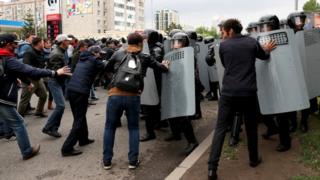Kazakhstan election marred by mass arrests
Police in Kazakhstan have arrested hundreds of people protesting against a poll to elect the country’s first new president in 30 years.
The election was called after long-time leader, Nursultan Nazarbayev, 78, stepped down in March.
His hand-picked successor, interim President Kassym Jomart-Tokayev, is widely expected to win the vote.
Protesters and opposition candidates claimed Sunday’s poll was not free and fair.
Mr Tokayev, 66, disputes their claims and has described the process as democratic and open.
Large-scale protests – the biggest the country has seen in years – against the election have been reported in Kazakhstan’s capital, Nur-Sultan, and its largest city Almaty.
At those protests, hundreds of peaceful demonstrators calling for a boycott of the vote, and several journalists and activists monitoring them, were detained by police.
A BBC correspondent in Nur-Sultan has seen people being dragged onto buses by riot police.
Mr Tokayev, who cast his ballot in the capital, has urged police to exercise restraint. He told the BBC his government would be tolerant towards those with different views.
Why are there protests?
Mukhtar Ablyazov, leader of banned opposition group the Democratic Choice of Kazakhstan, urged his supporters to take to the streets in protest over Sunday’s vote.
Believing the vote to be a sham with a predetermined outcome, the fugitive banker had called for peaceful protests in cities across the country on Sunday and Monday.
In a video posted to social media, he said “thousands of protesters” had gathered in Almaty’s Astana Square.
Demonstrators chanted “boycott” and “police with the people” before their protests were broken up by authorities.
The prospect of a democratic handover of power in Kazakhstan is “an illusion”, Human Rights Watch has said.
The Organisation for Security and Co-operation in Europe (OSCE), which sent more than 300 observers to monitor the poll, has never recognised an election in the country as fully democratic.
Aslan Sagutdinov, who was arrested last month for holding up a blank placard at a protest, told AFP news agency that he did not intend to vote in the poll.
“If you vote in unfair elections you are allowing them to say they are fair,” the video blogger, from north-western town of Uralsk, said.
Mr Tokayev was running for the ruling party – with backing from Mr Nazarbayev – against six little-known rivals.
What is the background?
In March, Mr Nazarbayev, the only man to lead the country since it emerged from the collapse of the Soviet Union in the early 1990s, shocked the country by announcing his resignation.
Mr Nazarbayev said he wanted to pave the way for “a new generation of leaders”, but is still expected to retain much of his influence as head of the governing party.
He has been largely unchallenged as leader of the oil-rich nation since 1989.
Mr Tokayev, a career diplomat and Mr Nazarbayev’s heir apparent, became the new interim president.
Given his close links to the outgoing president, the legitimacy of the presidential election has been met with scepticism.
Mr Tokayev’s first decision as interim president was to rename the capital Astana as Nur-Sultan in homage to Mr Nazarbayev.
That decision, which went ahead without public consultation, fuelled disillusionment with Kazakhstan’s government.
In the build-up to the election, authorities have reportedly been cracking down on opposition to Mr Tokayev’s interim presidency.
Protesters have been sentenced to short stays in jail and police have been raiding activists’ homes, according to AFP.
Source: Read Full Article



